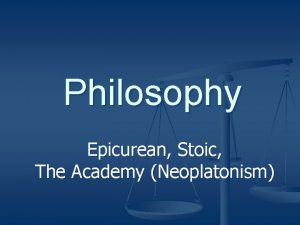The Stoic Philosophy stszm n 1 Indifference to










- Slides: 10

The Stoic Philosophy (stō'ĭ-sĭz'əm) n. 1. Indifference to pleasure or pain; impassiveness. 2. The doctrines or philosophy of the Stoics.

Origins Zeno of Cyprus (335 -263 B. C. ) – died at the age of 96 – taught at the Stoa Poikile (painted porch) Stoics – first to scientifically study Greek grammar and vocabulary

Zeno!

Famous Stoics • Aratus of Soli (c. 315 -240 B. C. ) – quoted by Paul in Acts 17: 28, from the opening lines of Phaenomena, which, along with Homer was read by all Greek students--it dealt with the phenomenon of seasons and astronomy, so vital to both agriculture and travel.

• 26 From one man he made all the nations, that they should inhabit the whole earth; and he marked out their appointed times in history and the boundaries of their lands. 27 God did this so that they would seek him and perhaps reach out for him and find him, though he is not far from any one of us. 28 ‘For in him we live and move and have our being. ’[b] As some of your own poets have said, ‘We are his offspring. ’[c] • Acts 17: 28 From the Cretan philosopher Epimenides • Acts 17: 28 From the Cilician Stoic philosopher Aratus • New International Version, © 2010 (NIV)

Famous Stoics • Brutus- friend and killer of Caesar • Seneca (c. 1 -65 A. D. )- the tutor of the young Nero, but finally resigned in despair as Nero "went bad. " • Marcus Aurelius (A. D. 121 -180)-emperor whose persecution of Christians was among the fiercest and most bloody.

Marcus Aurelius! "How lovely the soul that is prepared – when its hour comes to slough off this flesh – for extinctions, dispersion, or survival! But this readiness should result from a personal decision, not from sheer contrariness like the Christians. . . "

Major Beliefs • All things were governed by fates-determinism. • Self-denial contributes to the highest end in life. – There was a desire to suppress all passions. One was to show indifference to either pleasure or pain and mastery over all lusts. In such indifference one found contentment, thus self-control was a supreme virtue.

Major Beliefs • The soul is not immortal but exists until the destruction of the universe. At that time it was either destroyed (some said), or absorbed into the divine essence (others said). • Knowledge is empirically gained--they believed in tabula rasa of the soul. • All people are manifestations of the one universal spirit and should live in brotherly love and readily help one another.

Stoic quotes “The point is, not how long you live, but how nobly you live. " (Seneca) "How ridiculous and how strange to be surprised at anything which happens in life!" (Marcus Aurelius)



















